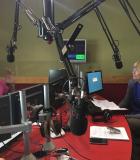Palestinian Health Sector Reform and Development Project (The Flagship Project)
USAID has supported the Palestinian Authority’s Ministry of Health in its development of the public health sector since the ministry was established in 1994. Recognizing the ministry’s commitment to creating a successful, integrated health sector, USAID supported its National Health Reform Strategy through the Palestinian Health Sector Reform and Development Project. Through the project, USAID supported the Ministry of Health, NGOs, and select educational and professional institutions in strengthening their institutional capacities and performance to promote a functional and democratic Palestinian health sector that is able to meet public health priorities.
Activity Description
USAID supported a strategic approach to strengthen health communication capacities within Palestinian institutions.
- Provided technical assistance to design and implement behavior change communication (BCC) programs and materials to address risk factors for chronic disease and injury (i.e. smoking, high cholesterol, obesity, seatbelt use, household safety and hygiene), to improve maternal and child health and nutrition practices (i.e. proper weaning foods, danger signs in pregnancy, hand-washing, selection of fortified foods, safe drinking water), and to promote health maintenance (i.e. anemia screening, breast self-exam, mammograms)
- Procured and deliver general humanitarian assistance, including assistive devices (wheelchairs, crutches, hearing aids), food baskets, clothing, water cans, blankets, tents, etc.), and
- Provided improved household practices for safe water use and hygiene
Expected Outcomes
- Improve governance and management practices in the health sector
- Improve the quality of essential clinical and community-based health services
- Increase the availability of essential commodities to achieve health and humanitarian assistance goals
Actual Outcomes
- Helped extend health services through the HIS to 77 percent of Palestinians living the West Bank, through 17 health facilities in eight governorates.
- Improved healthcare service delivery, increased health education among youth and women, and empowered communities to lend a voice in making decisions about healthcare services. The project was established in 83 communities in all 12 health directorates, led by community-based organizations. 1,352,327 participants benefited from the activities under this approach, over 1,000 community volunteers mobilized to carry out health and environmental awareness campaigns, an estimated $373,753 in local community contributions were leveraged.
- Provided advanced training for front-line providers: 46 ER staff received ESI triage training, 27 doctors and nurses were trained on trauma life support, and 54 ambulance drivers were trained as first responders.
- Procured $6.28 million in needs-based medical equipment, upgrading the Ministry of Health’s diagnostic and treatment services in hospitals.



